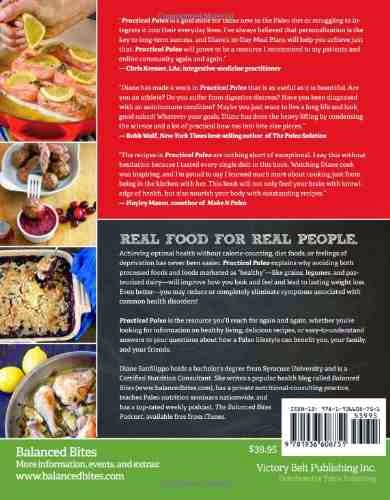 Practical Paleo: A Customized Approach to Health and a Whole
Foods Lifestyle is a recipe book with over 120 easy recipes to choose from.
Practical Paleo also includes a 30-day meal plans to support:
Practical Paleo: A Customized Approach to Health and a Whole
Foods Lifestyle is a recipe book with over 120 easy recipes to choose from.
Practical Paleo also includes a 30-day meal plans to support:- Immune health (autoimmune conditions)
- Blood sugar regulation (diabetes 1 & 2, hypoglycemia)
- Digestive health (leaky gut, IBS & IBD)
- Multiple sclerosis, fibromyalgia, and chronic fatigue syndromethyroid health (hypo and hyper - Hashimotos, Graves)
- Heart health (cholesterol & blood pressure)
- Neurological health (Parkinson's & Alzheimer's)
- Cancer recovery
- Fat loss
- Athletic performance
Practical Paleo is not only a recipe book but it is also a
guide for us to eat healthy by avoiding processed foods. By doing so, you will
look and feel good plus you also will be losing weight. The best part of it
all, Practical Paleo will help you decrease or completely take out symptoms
associated with common health disorders.
Practical Paleo consists of 432 informative pages and is
written by Diane Sanfilippo, who has written few books including “The 21-Day
Sugar Detox: Bust Sugar & Carb Cravings Naturally” and “The 21-Day Sugar
Detox Cookbook”. Diane Sanfilippo is a Certified Nutrition Consultant
specializing in blood sugar regulation and digestive health. She also writes
her own health blogs, teaches nutrition seminars and has weekly health podcast
in iTunes.
Going back to the Practical Paleo Resource Book, the
customer reviews are awesome. Diane Sanfilippo did a good job writing this
because it is easy to understand and the recipes are great, not to mention the
beautiful pictures. Even if you say that you are an expert in the Paleo
approach, you will still learn and find new things in this book.
Practical
Paleo Resource Book is a must have on every household, giving you tips
on how to live healthy, cook healthy and be healthy. It will definitely benefit
you and your family. Nowadays, there are a lot of fad diets that's confusing or
make you thin instantly, but is not a good approach to being healthy. The
Practical Paleo Resource Book has so much information that will help you
understand what Paleo is and how it can improve one's health.





